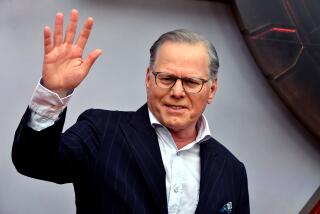Time Warner’s Leader Takes Leave to Fight Cancer : Management: Chairman and Co-Chief Executive Steven J. Ross resumes treatment. Some believe that he won’t return.
- Share via
Acknowledging for the first time publicly the apparent severity of his prostate cancer, Steven J. Ross, the flamboyant chairman and co-chief executive of Time Warner Inc., will take an indefinite leave of absence from the helm of the world’s largest media and entertainment company.
Ross’ decision to devote his full attention to a resumed treatment program, announced Sunday by the company, raised the possibility that the 64-year-old executive may never be able to return to Time Warner, the parent company of Warner Bros. movie studios as well as HBO cable television and Time, People and Sports Illustrated magazines.
In a letter sent Friday to his hand-picked co-chief executive and presumed successor, Gerald M. Levin, Ross said his physicians had advised him that he had not recuperated from the cancer announced in November and must undergo additional treatment.
“I have, therefore, finally conceded to my wife, three children and my doctors and agreed to disengage myself, through a temporary leave of absence, from my business activities,” Ross wrote. “This way I can concentrate fully on my recuperation!”
Ross closes his letter by writing: “I look forward to returning to the office as soon as possible.”
Analysts and others close to the company said Sunday that despite Ross’ optimism, the company is prepared to operate without its guiding hand and strategic visionary--and has come to terms with the expectation that Ross will not return to its helm.
“The assumption among informed people is that he wasn’t coming back,” said a source close to the company. “This affirms quite confidently that he is not coming back.”
Levin, often described as an intellectual with an affinity for the movie business, will be Time Warner’s sole chief executive for the duration of Ross’ absence.
Levin, 52, won his heir-apparent status in February in a dramatic boardroom power struggle with Nicholas J. Nicholas, Time Warner’s former No. 2 executive. Nicholas’ ouster appears now to have been the first major clue that Ross’ cancer was more advanced than he was publicly acknowledging at the time.
Nicholas cited differences with the company’s board at the time of his departure Feb. 20.
Richard Clurman, a former Time employee and author of the recent book, “To the End of Time,” which detailed the merger that blended Ross’ Warner Entertainment with Time Life, said the severity of Ross’s illness has been a secretive issue at the company since he announced his condition.
After revealing that he was suffering from cancer of the prostate, a small gland crucial to the male reproductive system, Ross has downplayed the extent of his illness and maintained that he expected to recover fully and resume his normal, hectic work schedule once the first round of chemotherapy treatments was completed.
In April, Levin reportedly told securities analysts in a private briefing that Ross was showing significant improvement after chemotherapy treatment and that he no longer exhibited evidence of a tumor. Ross was supposed to make his first public appearance in more than six months at the annual Time Warner shareholders meeting on July 16 in Los Angeles.
But sources close to the company say that when it became obvious that Ross’ condition would preclude him from making the appearance, Ross was forced to acknowledge the extent of his problem.
“They had to explain his absence,” Clurman said of Sunday’s announcement. “He was supposed to have been in remission. But now he’s not going to be at the annual meeting.”
Since beginning treatment, Ross has been in daily contact with the office from his homes in Manhattan and Long Island and has been closely involved in several recent strategic deals. These include a plan to sell a 12.5% stake of the Time Warner Entertainment division to Japan’s Toshiba Corp. and C. Itoh & Co. for $1 billion.
IBM was in discussions last month to invest $500 million in a Time Warner division as part of a plan by the companies to merge IBM’s computer technology with Time Warner’s movies, TV shows and cable TV system, industry sources said at the time.
“All the recent financial maneuvers have Ross’ imprint on them,” said Lisbeth Barron, an entertainment analyst at S. G. Warburg in New York. “All the financial structures and key management team members are pretty complete. Ross can step aside and feel confident--and so can investors. If Ross doesn’t come back, it’s OK. The company has never been in better shape.”
In his letter, Ross wrote that he was “completely comfortable” with Levin taking over during his absence, expressing confidence in Levin’s leadership skills and saying he and Levin share the same vision for Time Warner.
Analysts said Levin has been firmly in control since his promotion earlier this year.
With Ross’s latest announcement, however, Clurman said there will be renewed speculation about Levin’s ability to run the massive company.
“While he’s respected on both sides, the question is whether he is able to be CEO of the biggest media company in the world,” Clurman said. “Or do they need a bigger figure?”
Several entertainment industry figures, including former Fox Inc. Chairman Barry Diller, have been named as possible choices to join the company.
Levin won admirers throughout the new company by staying in touch with executives and innovators in the Time Warner empire of books and magazines, records, film and TV production and cable TV systems.
“I don’t think a lot is going to change here, especially not on a day-to-day basis,” said Fred Anschel, an analyst with Sherwood Research Group in New York.
Bio: Steven J. Ross Ross is taking a temporary leave of absence from Time Warner Inc. to resume treatment for prostate cancer.Age: 64
Born: Brooklyn, N.Y.
Education: Attended Paul Smith’s College, a vocational school in New York, 1948.
Family: Wife and three children.
Resume: Began his career selling trousers in New York’s garment district; president, Kinney Services, 1966-72; chairman and chief executive, Warner Communications, 1972-90; co-chairman and co-chief executive, Time Warner, 1990, chairman and co-chief executive, 1990-92.
Business philosophy: “If you’re not a risk taker, you should get the hell out of business.”
Times Staff Writer Alan Citron contributed to this report.
More to Read
Inside the business of entertainment
The Wide Shot brings you news, analysis and insights on everything from streaming wars to production — and what it all means for the future.
You may occasionally receive promotional content from the Los Angeles Times.










